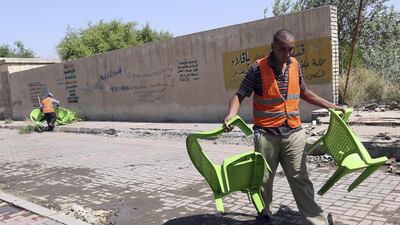BAGHDAD // At least seven people were killed and 28 wounded in Baghdad on Sunday as a suicide bomber struck preparations a major Shiite religious observance next month.
Residents of the Iraqi capital’s western Eskan neighbourhood were setting up tents ahead of Ashura, which commemorates the 7th century death of Imam Hussein, the grandson of the Prophet Mohammed.
No one immediately claimed the attack, but ISIL and other Sunni extremists frequently target Iraq’s Shiite majority, who they view as apostates deserving of death.
Ashura annually draws hundreds of thousands of Shiite pilgrims to Iraq, particularly the city of Karbala, where Hussain is buried.
Sunday’s attack came a day after a triple suicide bombing killed 11 Iraqi security forces and wounded 34 at a checkpoint north of Baghdad. ISIL claimed that attack.
Although ISIL continues to carry out attacks targeting Shiites and security forces, the extremist group has suffered a series of setbacks in Iraq in recent months, losing much of the territory it seized in the summer of 2014.
And now, US-backed Iraqi and Kurdish forces are preparing to push the extremists out of the country’s second largest city – Mosul.
An unlikely array of forces is converging on the city, lining up for a battle on the historic plains of northern Iraq that is likely to be decisive in the war against the ISIL.
The tacit alliance – Iraqi troops alongside Shiite militiamen, Kurdish fighters, Sunni Arab tribesmen and US special forces – underscores the importance of this battle. Retaking Mosul would effectively break the back of the militant group, ending their self-declared “caliphate,” at least in Iraq.
But victory doesn’t mean an end to the conflict. In a post-ISIL Iraq, enmities and rivalries among the players in the anti-ISIL coalition could easily erupt.
The battle, expected near the end of the year, threatens to be long and gruelling. If ISIL fighters dig in against an assault, they have hundreds of thousands of residents in the city as potential human shields. And as residents flee, they fuel the humanitarian crisis in Iraq’s Kurdish region around Mosul, where camps are already overcrowded with more than 1.6 million people displaced over the past two years. Humanitarian groups are rushing to prepare for potentially 1 million more who could be displaced by a Mosul assault.
The biggest prize captured by the militants after they overran much of northern, western and central Iraq in the summer of 2014, Mosul has been vital for the ISIL. The reserves in its banks provided a massive cash boost to the group, and the city’s infrastructure and resources helped the group as it set up its caliphate across Iraq and Syria.
r.
* Associated Press

